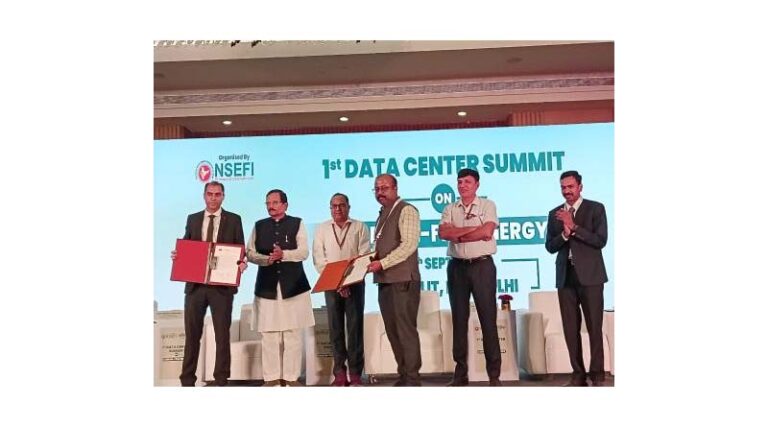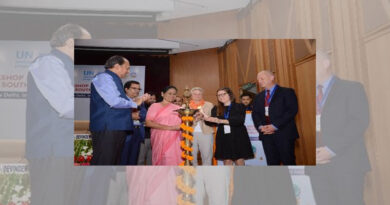
Greening India’s Digital Future: TERI and NSEFI Sign Pact On Sustainable Data Centers
26 September 2025, New Delhi: The Energy and Resources Institute (TERI) and the National Solar Energy Federation of India (NSEFI) Green Data Center Coalition today signed a Statement of Intent (SoI) to jointly advance research, policy, and implementation strategies for greening India’s rapidly growing data center industry. The collaboration will focus on technical assistance, electricity demand analysis, and pilot demonstrations to accelerate the adoption of reliable renewable energy with storage solutions for data centers at an affordable cost.
Partnership aims to drive research, policy advocacy, and renewable-powered pilots to make India’s fast-growing data centers carbon-free
Speaking at the signing, Mr Alekhya Datta, Director, Electricity & Renewables, TERI, said, “TERI projects that India’s data centers could consume approximately 390 TWh of electricity by 2070, underscoring the need for timely carbon-free power planning. With renewable energy plus storage already supporting industries in meeting 24×7 demand, a similar pathway can reliably power data centers. The continued decline in solar-plus-storage costs makes this transition both affordable and scalable.”
Mr Subrahmanyam Pulipaka, CEO, NSEFI, added, “Data centers are set to become one of the largest electricity consumers in the country by 2030. Through the NSEFI Green Data Center Coalition, we aim to provide a robust platform that unites stakeholders and supports policy, technology, and market solutions to decarbonize the sector. NSEFI will play a pivotal role in demand aggregation and in scaling firm power for data centers through innovative business models, while also enabling states to attract investments by positioning themselves as preferred destinations for sustainable data center growth. Our collaboration with TERI marks a crucial step in building a sustainable ecosystem for data centers in India.”
The NSEFI Green Data Center Coalition has been conceived as a dedicated platform to accelerate the decarbonization of data centers by shaping policy and regulatory frameworks, promoting innovative renewable energy instruments such as Virtual Power Purchase Agreements and round-the-clock storage, and preparing strategies for non-electricity decarbonization including cooling and energy efficiency. It also seeks to strengthen standards and compliance and foster the sharing of best practices on technology and ESG aspects across the sector. To achieve these goals, the coalition will engage with the central and state governments, host sensitization workshops for stakeholders across the value chain, connect data center operators with renewable energy providers, and disseminate global as well as domestic best practices for green data centers.
India is one of the largest data consumers in the world, with over 19 GB of data consumed per person every month. This surge in digital penetration and adoption of data-intensive technologies has fueled the demand for data storage, leading to a proportional rise in energy-intensive data centers. These facilities consume up to 50 times more energy per square foot than standard commercial office buildings. By 2030, data centers could account for as much as 6% of India’s total electricity demand, up from less than 1% today. Greening data centers could potentially reduce their emissions by 88%, with transformative impacts for the country’s overall decarbonization targets.
The Statement of Intent was signed at the inaugural plenary of the 1st Data Center Summit on Carbon-Free Energy, organized by NSEFI and powered by Amazon. The event was addressed by senior officials from NSEFI and Amazon, with Shri Shripad Yesso Naik, Hon’ble Minister of State for Power, New & Renewable Energy, gracing the occasion as Chief Guest.
By combining TERI’s expertise in research and technology assessments with NSEFI’s coalition-building and industry advocacy, the initiative aims to chart a roadmap for sustainable data center growth in India. This collaboration will not only strengthen the country’s ability to meet its 2030 renewable energy targets but also contribute substantially to reducing carbon emissions by 50% from 2022 levels, making India’s digital transition truly green.
Also Read: Tropical Agro Unveils AI – Enabled Tech Tools To Tackle India’s 7 Million Tonnes Fruit Loss Problem
📢 If You’re in Agriculture, Make Sure the Right People Hear Your Story.
From product launches to strategic announcements, Global Agriculture offers unmatched visibility across international agri-business markets. Connect with us at pr@global-agriculture.com to explore editorial and advertising opportunities that reach the right audience, worldwide.






